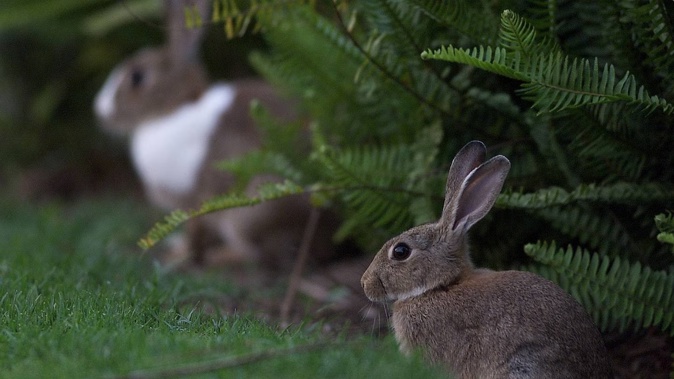
Auckland Council is warning against people releasing rabbits and other animals into forests and parks ahead of the Year of the Rabbit Lunar New Year saying they could have a devastating impact on the environment.
A couple was seen on Sunday releasing a pet rabbit at Western Springs Park as part of a Buddhist practice called “fang sheng” or mercy release.
A woman told the Herald she was surprised when the couple took the rabbit out of the box in a forested area near the park’s playground, said some prayers and then left the animal.
“I thought they had forgotten their pet and chased after them as they were walking to their [car], but the wife explained they were setting the rabbit free as part of their religious beliefs,” said the woman, who did not want to be named.
“I was shocked. I didn’t think the baby rabbit would survive. But because it was so tame, it came up to people and I think someone else ended up taking the rabbit home.”
Dr Imogen Bassett, Auckland Council’s biosecurity principal adviser, noted an increase in animals being released in the lead-up to the Lunar New Year.
It is more common for fish, birds and sometimes turtles to be released, but some are choosing rabbits because the coming Chinese New Year is the Year of the Rabbit.
“We are aware that Western Springs lakeside is sometimes the site of animals being released into the wild, either as dumped pets or as a spiritual practice, and have noted this can increase in the lead-up to the Lunar New Year,” Bassett said.
“While often well-intentioned, releasing captive animals into the wild is not in the released animals’ best interest and it can also harm our natural environment.”
Western Springs Lakeside Park is known as a place where rabbits and other animals are illegally dumped. Photo / Brett Phibbs
Life release, or fang sheng in Chinese, is a traditional Buddhist practice of freeing captive creatures, and the participants believe that by doing so they generate spiritual merits.
The intention of the practice is to show compassion to caged creatures, but sometimes this can cause more harm than good to wildlife.
“Released animals may not be able to find sufficient food, shelter or adapt to the environment around them, leading to animal welfare problems,” Bassett said.
“Sometimes people think that even if the released animal dies after release, at least it is in its natural home. However, rabbits are not native to New Zealand, and do not belong in the wild here.”
Bassett said that rabbits are one of the 100 worst invaders in the world and can have a devastating impact on New Zealand’s native plants and ecosystems which “are not adapted to mammalian herbivores”.
“Rabbits’ digging can also cause significant erosion. In the case of Western Springs, which is home to some important native freshwater species, sediment run-off from rabbits burrowing can make the water murky and further threaten our already fragile native freshwater ecosystems,” she said
“For this reason, people are not permitted to release rabbits into the wild in Auckland under our regional pest management plan.”
She encouraged people wanting to release animals into the wild to get involved with conservation organisations such as Kiwis for Kiwis.
These organisations protect native species through captive rearing and reintroduction programmes.
Buddhist community leader Janet Chan. Photo / Martin Sykes
Janet Chan, an Auckland Buddhist community leader, said the “principles behind the practice are good” but people should not just blindly follow and be mindful of their surroundings.
“Normally, the practice involved people buying animals that are due to be slaughtered and letting them go as an act of compassion,” Chan said.
“But this should be in the animal’s native and natural surroundings, and not just releasing them anywhere.”
SPCA science officer Dr Alison Vaughan said animals abandoned in an unfamiliar environment are vulnerable to starvation, disease, injury or death.
The SPCA, which has 85 rabbits in its care at the moment, had not seen an increase in rabbits being adopted in the lead-up to the Lunar New Year..ing populations of stray,, animals,” she said.
Vaughan said deserting an animal was also an offence under the Animal Welfare Act 1999.
The SPCA which has 85 rabbits in its care at the moment had not seen an increase in rabbits being adopted in the lead-up to the Lunar New Year.
“SPCA has robust processes in place to ensure a good match between animals’ needs and potential adopters’ live styles and experience to make sure animals are adopted into responsible homes,” Vaughn said.
Take your Radio, Podcasts and Music with you

/cloudfront-ap-southeast-2.images.arcpublishing.com/nzme/YGI72FUVJZDEXK6L3BCWGPTX3Q.JPG)
/cloudfront-ap-southeast-2.images.arcpublishing.com/nzme/R7VUHSC5C5GF5OQ2FCVXF2BZ54.JPG)








